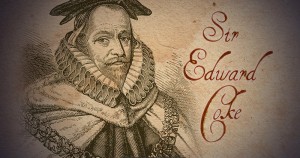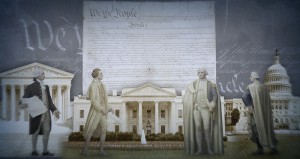About the Film
Magna Carta was sealed by King John in the summer of 1215, in a muddy field in Runnymede outside of London. Up until this moment, monarchs ruled as if they had powers given to them by God, but after, they agreed to be limited by the law of the land. This was the starting point for the English tradition of the rule of law and the right to due process–ideas that became fundamental principles in America.
 Over the next 400 years, Magna Carta was renounced, reaffirmed and eventually forgotten. But this changed in the 17th century when Sir Edward Coke brought the document back to life. Coke was an influential English judge and legal historian who argued all free Englishmen had rights the King had to respect. Magna Carta, Coke alleged, was the source of those rights.
Over the next 400 years, Magna Carta was renounced, reaffirmed and eventually forgotten. But this changed in the 17th century when Sir Edward Coke brought the document back to life. Coke was an influential English judge and legal historian who argued all free Englishmen had rights the King had to respect. Magna Carta, Coke alleged, was the source of those rights.
It was Coke’s interpretation of Magna Carta that sailed with the colonists to the New World. Magna Carta became a rallying cry at the start of the Revolution and, eventually, the colonists incorporated ideas that evolved from Magna Carta and Coke’s interpretation of it into their new Constitution. Fair trials, habeas corpus, and an independent judiciary can all be traced back to Magna Carta and Coke’s writings. The connection is even stronger in the Bill of Rights, where the 5th and 14th amendments provide a right to due process.
Over time, the Supreme Court has been instrumental in ensuring that all Americans have the same fundamental rights to due process and that rule of law is protected and preserved. So in 1931, when nine young black men in Alabama known as the Scottsboro Boys were convicted of rape and sentenced to death without a lawyer, the Supreme Court agreed to hear their appeal alleging that their right to due process had been violated. In Powell v. Alabama, the Court insisted for the first time that states had to protect the right to due process.
And the Supreme Court has played a key role in affirming the rule of law. In the height of the Watergate scandal, the Supreme Court declared in a unanimous decision in U.S. v. Nixon that no one, not even the President, is above the law.
 The sealing of Magna Carta was the first time that a King agreed to be bound by the law and to respect certain rights of his subjects. Those ideas have been expanded over centuries to form bedrock principles that Americans live by today. No one is above the law, and we all have rights that our government must protect.
The sealing of Magna Carta was the first time that a King agreed to be bound by the law and to respect certain rights of his subjects. Those ideas have been expanded over centuries to form bedrock principles that Americans live by today. No one is above the law, and we all have rights that our government must protect.
Further Reading
“Magna Carta: Muse and Mentor” Exhibition at The Library of Congress
Professor Nicholas Vincent on the consequences of Magna Carta
Professor A.E. Dick Howard, “Magna Carta: 800 years after Runnymede”
BBC Radio series, The Road to Magna Carta
Credits
Producers, Robe Imbriano and Maria Matasar-Padilla
Writer and Narrator, Robe Imbriano
Editor, Marc Tidalgo
Graphic Animators, Victoria Nece, Hiroaki Sasa, Thomas Curtis and Stephanie Gould
Photography, Edward Marritz, Brett Wiley, Matthew Green, and Thorsten Thielow
Senior Production Associate, Bonnie Birmingham
Sound, Mark Mandler, Peter Ginsburg, Michael Boyle, Peter Penebre and Sam Brolan
Music, Audio Network
Head of Production, Innbo Shim
Production Accountants, Mara Connolly and Andrea Yellen
Assistant to the Executive Producer, Rachael Benjamin
Senior Producer, Kayce Freed Jennings
Executive Producer, Tom Yellin

